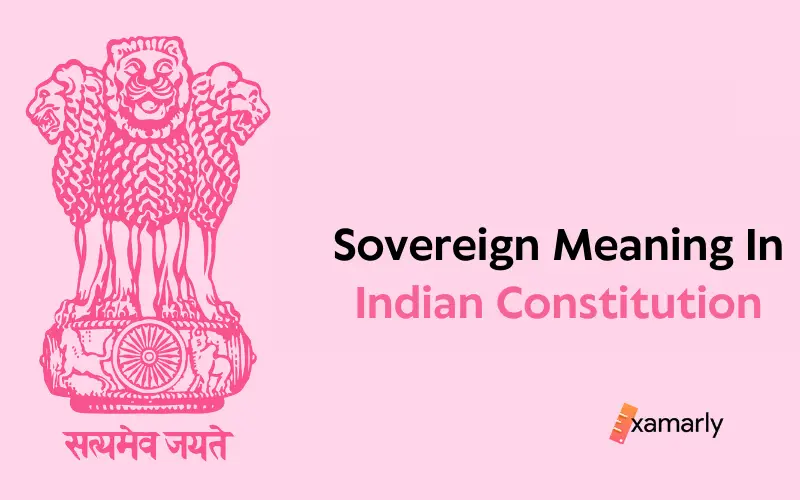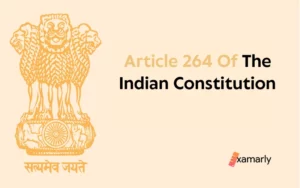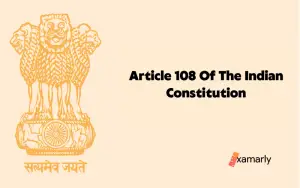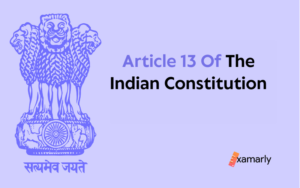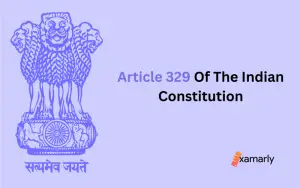India is a country capable of being an independent strong nation without any supervision. That is what says “Sovereign meaning in Indian constitution”. Let us get to know more about it in detail.
Preamble Of The Indian Constitution
The preamble to the Indian Constitution is a concise introduction that outlines the fundamental values, goals and core values of the constitution. Some notion well about the following is provided by the preamble: the constitution’s origin, the character of the Indian state, a description of its goals, and the date it was adopted.
Sovereign: Keywords of the Preamble
- The preamble of the Indian Constitution was enacted on the 26th of November, 1949. But it came into effect on the 26th of January, 1950.
- There is a total of eight keywords in the preamble to The Indian Constitution. sovereign, socialist, secular, democratic, republic, justice, liberty, equality, and fraternity, and one of them is sovereign, which means an independent authority.
- The term “sovereign” stands for the authority or Supreme power of a state that is wholly independent.
- Unlike some keywords introduced after the 42nd amendment, the term was there in the preamble from the time it was written by the Constituent assembly and was drawn from an article of the Irish constitution.
- Every state grants Power of sovereignty to the individuals, group, or organization that has full Executive power over other people and the ability to enact new laws or change those that currently exist.
History
- The idea that the people retain primary control over governmental affairs is known as the principle of popular sovereignty. This idea’s foundation can be traced back to the social contract’s fundamental theory.
- Rome during the reign of Julius Caesar is where the concept of this popular sovereignty first appears.
- “Sovereignty is one, indivisible, unalienable, and imprescriptible; it belongs to the Nation; no group can assign sovereignty to itself, and no individual can arrogate it to himself,” says the French constitution of 1791.
- As a result, the concepts of popular sovereignty—executed largely by the people—and national sovereignty—executed by a nation represented by an organized state rather than an unorganized people acting in their natural state—were blended.
- J. J. Rousseau popularized this idea in modern times.
- In his book “The Leviathan,” Thomas Hobbes, an English philosopher provided modern meaning to the term and claimed that in the “state of nature,” people were essentially ruthless and selfish. Because of this, to ensure their survival, they gave up all of their rights and handed them over to the government, which could protect and assist them in surviving.
- The concept of this popular sovereignty concept suggests that those subject to governmental Powers and jurisdiction have a full and equal right to have the representation in the body that formulates laws.
- The pluralistic approach likewise asserted that the state can have no special Authority in comparison to the other facets of society and is only one of numerous instances of social harmony.
- The French word ‘Souverain’, was borrowed from the Latin word ‘Superanus,’ and then it become the source for the English word ‘Sovereign.’
- Article 5 of the Irish Constitution stipulated about the state that was “sovereign, independent, and democratic.” it was later replicated and incorporated into the Indian Constitution.
Anybody who wields significant political power and influence and is regarded as the supreme leader might be considered a sovereign in English. The term “sovereign” was quite commonly used to refer to a ruler; the meaning has indeed transitioned over time.
Sovereign Meaning In Indian Constitution
- According to the Indian constitution, India is a completely sovereign Country and is not a colony of any other Foreign Power or nation. It has full discretion over how to handle its own business. There are two different kinds of discretion: Internal and External.
- Internal sovereignty is concerned with how a state’s citizens in terms interact with the state as a whole. This means that it has the authority to enact laws that will advance the welfare of the populace, including their health, morals, education, and general well-being, subject only to the federal division of legislative Powers and other restrictions established by the Constitution, such as the guarantee of their fundamental values and rights.
- The four essential components of internal sovereignty are the legislature, the executive branch, the judicial branch, and the administrative branch.
- But when we talk about external sovereignty, we mean sovereignty that focuses on international rules.
- The affairs of the state are not reliant on any other state. It operates independently of other nations and is not dependent on any external power for its dealings with other governments.
- India’s ability to transfer any portion of its territory and absorb any foreign area per the relevant constitution at the moment ensures the sovereign country’s continued exercise of its exterior sovereignty.
- The Union of India has a federal structure or form of government which is composed of a unique constitutional form that contains a division of powers amongst the states and the Union.
Related – Meaning of Sovereign
Concept of a Sovereign state
- In a sovereign state, the governing body has absolute authority over itself and is free to handle any issues that arise. But exercising sovereignty does not entail cutting a state off from other countries. A certain set of international regulations must be followed by the state in its interaction and participation with other countries.
- Indian people are bound by Article 51(c) of the constitution to “uphold and safeguard India’s sovereignty, unity, and integrity.” It declares that citizens are responsible for upholding the constitution’s values and mechanisms.
- This article mandates that the government “improve and encourage the respect for international law.” A sovereign power’s ability to assert its authority might be considered to be unrestricted.
Conclusion
The preamble of the Indian constitution was adopted and enacted on November 26, 1949. It concluded that “having solemnly resolved to establish India into a sovereign democratic republic,” the citizens of the state were directly provided with the authority of sovereignty.
Union of India in 1949, announced remaining a full member of the Commonwealth of Nations and recognized the British monarchy as the Commonwealth’s Head or supreme authority.
One of the preamble’s essential terms, “sovereign,” refers to a state’s independence and ability to handle its affairs without outside assistance. Constitutional supremacy is one definition of sovereignty.
FAQs
Under The Constitution Of India Who Are The Ultimate Sovereign?
According to the Indian constitution, the Indian People are the supreme sovereign. They are granted several fundamental rights. They are not held accountable to anyone, according to the right to freedom. They are permitted to make decisions for themselves.
What Is The Basic Definition Of Sovereign?
The basic component of sovereignty denotes absolute power. Being sovereign for a state entails its independence to handle both interior and exterior matters on its own.
What Is The Origin Of The Word Sovereign?
The French word ‘Souverain’, was borrowed from the Latin word ‘Superanus,’ and then it become the source for the English word ‘Sovereign.’
What Are The Four Concepts Of Sovereignty?
The four concepts of sovereignty are authority, territory, recognition, and population.


